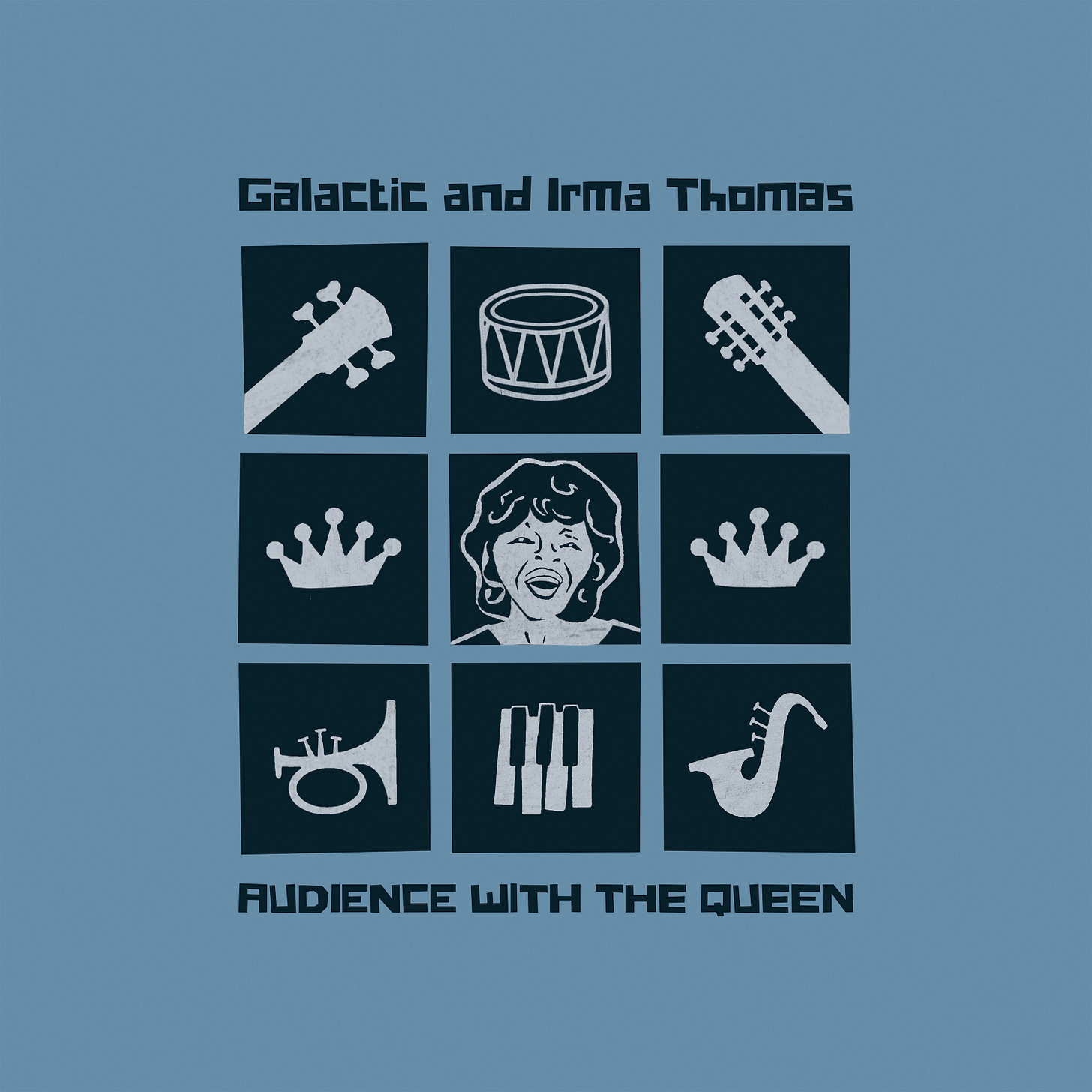Album Review: Audience With the Queen by Galactic & Irma Thomas
With the help of Galactic, the Queen of New Orleans lets us share her life. She has a biography fit for film, and in these scarcely 33 minutes, she packs only a bit of it.
Irma Thomas recorded her best‑known song, “Ruler of My Heart,” in 1963. The title Soul Queen of New Orleans was pinned on her in the 1970s by a record company for marketing purposes when things were not going so well commercially. It was hardly far‑fetched, and no one has ever wrested it from her. Irma is Louisiana’s equivalent to Aretha Franklin. She rightfully bears the official designation “Queen of Southern Soul,” so we are granted an Audience With the Queen. The backing band Galactic can be regarded as service providers at her side; incidentally, this is not the first time the Queen has been in the studio with them.
Not every ensemble can adapt to Irma Thomas’s way of singing without stumbling because the singer makes music rather idiosyncratic. Again and again, she inserts tones that are written nowhere—Thomas tones that lie somewhere in eighth‑step intervals on the scale and that you don’t even see in the transcribed notes, for example, when she tells of the “broken law” in the song “People” and her voice scratches, Galactic clatter along quite smartly.
Irma started out in a gospel choir as a teenager—where else? The imprint remained and still flows in today. When nowadays, “the whole damned world’s on fire (…) and the people are tired,” as in “Lady Liberty,” her solution is, therefore, “God save us all!” Yet Louisiana’s musical tradition reaches far beyond church choirs. The region carries French influences from accordion music, Zydeco, Cajun, swamp rock, the origins of Delta blues at the mouth of the Mississippi, Dr. John’s voodoo psychedelia, today a small hip‑hop scene, and a large brass‑funk landscape. Cajun rhythmic feel, the dirty wash of swamp style, and dominant horn sections all mark the collaboration and arrangements of Galactic and Irma.
Everything is always rooted in the blues anyway, audible in “Over You,” about a new start in love after tears and separation. “Peace In My Heart” cultivates a certain sunglasses‑in‑the‑casino psychedelia in which one is not quite sure what trump cards the woman with the cool I‑run‑this‑place voice and the simmering lead guitar have up their sleeves.
And—let us not forget—New Orleans is, alongside Memphis, the lesser‑known source of Southern Soul. Unlike Atlanta, it is conceived less orchestrally; unlike Stax in Tennessee, it is less bass‑ and keyboard‑heavy, but instead more undulating in rhythm—see the earworm “Puppet On Your String,” preferably in short, rough songs, often with a focus on trumpet or multi‑voiced brass sound paintings, as here at the end of “Peace In My Heart.” A fine device is also the oxymoron of the brittle, rough‑grating sentimental ballad such as “Love’s Gonna Find a Way Again.”
Southern Soul in the late ‘70s and early ‘80s exerted a subliminal influence far beyond the region on artists from Huey Lewis to Joe Jackson to Talking Heads, who danced stylistically between chairs. Conversely, (disco) funk moved into New Orleans from outside. Typical wah‑wah guitars accordingly mix in “Be Your Lady” with regionally colored blaring brass. The lyric is also very Deep South, using rattlesnakes and sugarcane as metaphors in a relationship analysis—“mean as a rattlesnake and sweeter than sugarcane.”
As long as the artist has been in the business, she enriches some lyrics autobiographically. She has been performing for 66 years, interrupted neither by the COVID pandemic nor by repeatedly being dropped by record labels. In the beautiful “Where I Belong” she admits that, despite life experience, wisdom, and routine, one will always experience ups and downs and must make the best of the lows. She says she sipped champagne in Paris while on tour and sometimes forgot her roots or what mattered, but ultimately felt where she belonged—“Where I Belong.” Her home remains New Orleans and its music. “I still have a love affair with the sound (…) and I love what I do, and I’m lovin’ every minute of it.” Spirited saxophone riffs chirp in between, and she carries her heritage forward. The distinctly entertaining track swings with the feel of the Blues Brothers.
In “People,” the Queen recalls the existential experience of Hurricane Katrina, which took so much from her: “the sound of hurricane’s washing on my door.” Her private house, the nightclub she ran—everything floated away. “I see them children born, and I watched them grow,” she refers to the four children she bore as a minor in the 1950s and fed with bar jobs because music did not bring in enough.
Irma Thomas has a biography fit for film, with more lows than high flights, and in these scarcely 33 minutes of Audience With the Queen, she packs only a bit of it. Ultimately, though, one already notices in the first song, “How Glad I Am,” that this 84‑year‑old living legend is glad about her life. When she resounds in the chorus alone like an entire choir, you feel: you have to listen to this woman—she has lived. Her most recent positive experience was a performance with Mick Jagger at last year’s festival. They sang “Time Is On My Side” as a duet—the song she had recorded first; later, the Stones adopted it into their repertoire.
Great (★★★★☆)
Favorite Track(s): “How Glad I Am,” “Where I Belong,” “People”


